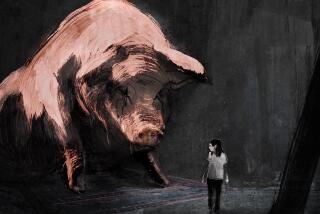The Moral to This Story Is Islamic : Movies: ‘Salam’s Journey,’ created in Santa Ana, is about a boy and his elephant. It expresses Muslim values.
- Share via
As American children are captivated by Pocahontas and her animal friends, Muslim kids in the Middle East are delighted by little Salam, his playful elephant and Hudhud the talking bird.
Avoiding the romantic flirtation of “Pocahontas” and the vivid violence of most cartoons, a Santa Ana animation company has produced a cartoon video acceptable to Islamic officials that has sold nearly 30,000 copies since late last year in Kuwait and neighboring countries.
“Salam’s Journey” is making its mark as the first U.S.-produced animated movie to promote Islamic values, said the president of the Orange County firm that made the 40-minute video.
“Our main concern is whether the kids really watch it, and we know that some parents say their kids have watched it 20 or 30 times,” said Wissam W. Ahmed, president of International Cartoon and Animation Center, which is on East 17th Street.
Much of the credit for the professionalism of the animation, he said, goes to cartoonist Ed Damattia, whose credits include work for Disney, Warner Brothers and Hanna-Barbera studios, in the cluster of cartoon factories in Studio City and Burbank.
Damattia, who worked on Disney’s “Pinocchio” and was a master animator for “The Smurfs” cartoons, “gave a liveliness to our characters that we needed,” Ahmed said.
The last Ahmed heard, the semi-retired Damattia was teaching animation techniques in China.
Ahmed, who has a doctorate in computer science from USC, said he first discussed the idea of making an entertaining animated movie about six years ago with Abdul Rahman Al-Ajmi, a Kuwaiti civil engineer who was then working in Los Angeles.
By late 1992, Al-Ajmi, also president of the Islamic World Committee in Kuwait, came up with $350,000 to finance the project and Ahmed’s studio was launched.
The movie’s fictional characters of Salam, his elephant Mahmood and Hudhud the bird are woven into a story from the Koran, the Muslim holy book, about an Ethiopian king who builds a castle in Yemen and orders believers to make a pilgrimage to his castle rather than to Mecca.
While playing in the jungle, Salam and his elephant are kidnaped by pirates of the evil king. The monarch, angered because no one attended his castle’s opening ceremony, decides to use the elephant to help his army destroy the Kabah, the house of worship in Mecca that is the focus of the annual Muslim pilgrimage.
But Allah, the Muslim name for God, stops the elephant and sends many birds carrying small stones to disperse the army. Salam is saved, returns to his parents and is reunited with his pachyderm pal.
Although the story includes violence, Ahmed said that his animators were careful not to show bloodshed or killing. “You know from the story, however, that the army was defeated,” he said.
And, sensitive to Muslim dislike of displays of lust or unmarried love, Ahmed said, “This production does not have kissing or hugging, except by the parents when he is reunited with his family.”
The aim of the movie is to teach the importance of friendship, trust in God and family values, he said.
In that regard, Ahmed added, Disney’s “The Lion King” was admired by Muslims for portraying how good prevails over evil and demonstrating the qualities of foresight and strength of character.
But many other film entertainments from the Western World fail the Islamic morals test. The Kuwaiti press is full of warnings by Islamic conservatives who bewail the “invasion” of foreign cultures, especially through satellite television programs they are unable to censor, according to an Associated Press story.
But the same story from Kuwait also quoted Abdul Hamid al-Bilali, a U.S.-educated electrical engineer, who praised “Salam’s Journey” as “a courageous step,” adding that his 8-year-old daughter has watched it repeatedly.
“Although it can’t compete with companies that have a long history of producing cartoons, it’s succeeded in connecting our children to their own history,” al-Bilali said.
In his Santa Ana studio, Ahmed said that the only criticism he has received so far is that audiences “want the quality to be that of a $44-million Disney production.”
The present version of the film is in Arabic. Ahmed, 45, said that his studio is nearing completion of versions of “Salam’s Journey” in English, Malay and Urdu, the latter language for the large Indo-Pakistani Muslim market.
“We would also like to sell it in the U.S. market--to Muslims and non-Muslims,” he said.
If the company reaches its goal of selling 100,000 copies, Ahmed said the next movie may be about a legendary 15th-Century Muslim seafarer or perhaps more adventures of the spunky Salam.
More to Read
Sign up for Essential California
The most important California stories and recommendations in your inbox every morning.
You may occasionally receive promotional content from the Los Angeles Times.













